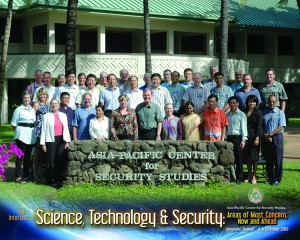
Participants of the "INTERFACE OF SCIENCE, TECHNOLOGY & SECURITY: AREAS OF MOST CONCERN, NOW AND AHEAD" workshop pose for a photo in front of APCSS.
The workshop brought together subject matter experts, strategic policy planners, from throughout Asia-Pacific region. With the realization that ongoing scientific and technological developments will affect international security with potentially negative or harmful impacts and possibly provide critical opportunities for security cooperation, APCSS sought to understand the technology-security interface that forms the underpinnings for regional/national adaptation and mitigation strategies needed in an ever-changing, fast-paced and complex defense and security environment. Then, to explore new ways of thinking about these developments and phenomena and how they are likely to change the world. And, identify ways and means of collaboratively engaging others related to such developments and phenomena.
On the first day of the workshop, the keynote address was delivered by Dr. Arun Mujumbar, Director, Advanced Research Projects Agency-Energy (ARPA-E), followed by a welcome reception hosted by the APCSS Foundation.
“Fifty percent of energy is wasted,” declared Mujumbar. “Buildings are the largest consumer of energy. Most people know the horsepower of their car but don’t know the horsepower of their homes. We need to develop smart meters to better learn where energy is being used and wasted within the home.”
Mujumbar, who also worked on the BP (British Petroleum) spill recovery, also said “BP was a wake-up call. The US imports 60% of its oil. We need to make that zero! Energy innovation is at the core of our national, economic and environmental security.”
On the final day, participants delivered their final briefings to former Secretary of Defense Dr. William Perry, who gave them constructive advice and feedback.
The ultimate goal of the workshop was to continue the development of a more sensitive, respectful understanding of regional perspectives of subject matter experts and responsible officials concerning the identified current and emerging set of scientific and technological conditions.
A complete article on this will be published next week.
[nggallery id=8]






Leave A Comment